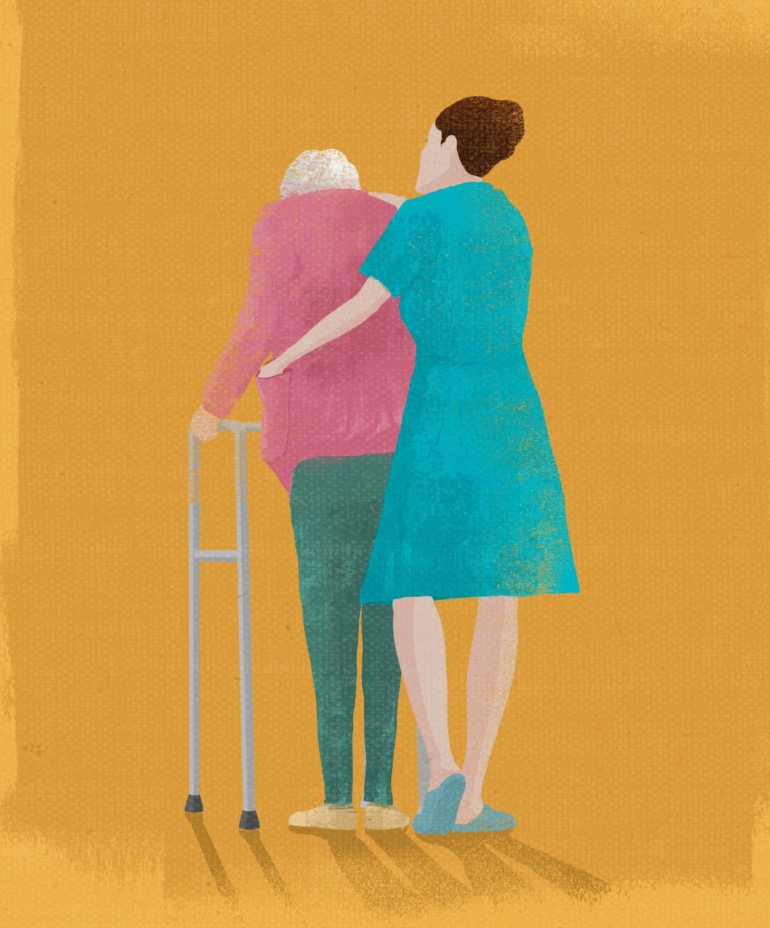Earlier this year, a doctor from Kaiser Permanente contacted Marin County’s Adult Protective Services (APS) because she was concerned about an 89-year-old San Anselmo woman. The doctor said her most recent urine toxicology report indicated benzodiazepines in her blood — even though she had not been prescribed them, and they could dangerously interact with her other drugs. According to Marin County court documents, she was also malnourished, and her caretaker — her son— had canceled approximately 70 doctor’s appointments in 18 months, making it difficult for the doctor to treat the woman, who had dementia.
APS referred the case to the sheriff’s office, which followed up and found the malfeasance ran even deeper. “When we get into cases like these,” says Marin County Deputy Sheriff Ed Rudolph, “we inevitably almost always find that at the bottom, the motive was theft.”
Over a two-year period, the woman’s son, now 63, had allegedly embezzled more than $180,000 from his mother’s accounts, approximately $154,000 of it to pay accounts on PayPal. It is believed that this went to help pay for opioid drugs he was addicted to, after a period of treatment for back pain. In August he pled no contest to embezzlement by a caretaker of an elder and received a sentence of two years in state prison; his sentence was suspended so he could enter substance abuse treatment instead. His mother died in June.
The son’s crime — financial abuse of an elderly person — is not unusual. According to a 2018 U.S. Securities and Exchange Commission report, 2.7 to 6.6 percent of American seniors suffer some sort of financial exploitation each year. And such cases seem to be increasing. Exact figures are hard to cite, as many cases go unreported, but last year alone, Marin’s APS investigated more than 250 instances involving alleged financial abuse, says Mark Vanderscoff, the county’s Adult Social Services Program manager. “Anecdotally, we’re seeing more in my department,” he says. “They are on the rise.”
Financial abuse can occur in a variety of ways. Con artists hook seniors through phone scams. Unscrupulous financial advisers might drain an older person’s account. A contractor may charge four times what a new roof is worth. Pilfered sums can range from a caregiver’s unauthorized $50 Visa charge to $100,000 missing from a savings account. According to a study commissioned by True Link Financial, older people lose more than $36 billion annually to this type of crime.
Recently Sheriff Rudolph’s office has received several reports about elderly people duped by fraudulent IRS calls made to their landlines (which scammers appear to prefer over cellphones). “These seniors are people who have been paying taxes their entire lives and have been very ethical about it,” he says, “and then suddenly they get a phone call from someone telling them they owe $10,000 in taxes and they just don’t understand.”
Rudolph says the callers warn seniors the money is due immediately and advise them to get a cellphone, go to Safeway, buy a Green Dot card — basically, a cash card — and let the scammers direct them via cellphone on how to load the card with cash. “What these phone solicitors then do is ask for the PIN on the back of the card,” Rudolph says, “and once the person gives the serial number off the back and the PIN, the money’s gone — before they’ve even left Safeway. There’s no tracking it.”
Unfortunately, the greatest risk factor for suffering financial abuse is simply growing old — something we all do, if we’re lucky. When aging causes mental and physical decline, one of the first things to go can be the ability to manage money. “Financial judgment can already be seriously impaired before anyone realizes that there is Alzheimer’s disease or related dementia,” says Carolyn Rosenblatt, a nurse and attorney who runs San Rafael’s AgingParents.com, which helps families dealing with elder abuse.
Common wisdom holds that older people make prime targets because they’ve accumulated a lifetime of wealth. But studies show the elderly poor are even more vulnerable. Also, recent retirement fund trends puts seniors at risk.
Twenty or 30 years ago, retired people usually received a monthly pension that was managed and distributed by their employer. Now, many receive a 401(k) or other lump sum they have to manage on their own — often at a time in life that they’re least equipped to do so.
While elder abuse is on the rise nationwide, demographically Marin has an even greater risk. Already, ours is the oldest population of all nine Bay Area counties’ and one of the oldest in the state. It’s estimated that by 2030, 33 percent of Marin residents will be over 60. And we’re the healthiest county in the state, which means people here live a long time. “We also have a lot of people here who are house-rich, even if they are cash-poor,” Rosenblatt says. “I mean, even a shack in Marin is worth a million bucks.”
But Marin is also well equipped to handle reported financial abuse. Since 2005 the county has had a Financial Abuse Specialist Team (FAST), made up of retired certified public accountants, bankers, and realtors, who help law enforcement manage complex financial cases. “There are a tremendous amount of resources available to us in law enforcement to help if you’re a victim of fraud and you need help,” Rudolph says.
Still, one of the biggest problems with elder abuse is that often it’s never reported. A study in New York state showed that for every documented financial exploitation case, another 44 go unreported. Some people are ashamed they’ve been duped; “basically it comes down to embarrassment and [fear of] loss of control,” Vanderscoff says. “Let’s say you trusted your caregiver, and he or she has gotten $20,000 from you. You don’t want to admit that to anyone because it may make you look like you’re getting dementia or are not able to handle your affairs.”
Family ties can also keep seniors quiet. In a study cited by the National Center on Elder Abuse, almost 58 percent of those who financially exploit elders are relatives — an adult-child like in the San Anselmo case, or a niece who suddenly becomes chummy with a lonely aunt. “People are hesitant to report this crime to the police because they don’t want their name tarnished or their family in the paper,” says Rudolph. “And getting help from law enforcement may mean that the other person may go to jail. You almost get into a domestic violence situation. They still love the person even if they’re being victimized by them.”
Sometimes, it’s an outsider who might prey on a socially isolated senior, causing another type of family problem. Lee Smith* recalls that her father was in his late 60s when he became friendly with a county worker assigned to look in on an elderly man who lived next door. After the worker, Jan*, interviewed the dad about the neighbor, she and the dad started dating; soon after, Jan began to cut Smith and her sister out of their lives.
Smith’s dad and Jan eloped in 2001, causing such a falling-out that the two sisters mostly stopped seeing their dad. Several years later they got a call from Marin General Hospital, informing them he was dying of lung cancer. After his death, they learned he had changed his will five months before dying; everything he owned was now going to Jan and her daughter.
Smith and her sister sued. Though there was no conviction, the judge ruled that upon Jan’s death, 25 percent of the sale of the house must go to Smith’s and her sister’s children.
Smith remains convinced this was elder abuse. “My father was sick with terminal lung cancer and was undergoing chemotherapy” when he changed the will, she points out. More than a decade later, the outcome still stings, proof of just how far-reaching the impact of this crime can be.
And just how common, Rosenblatt adds. “We see all kinds of financial abuse in this county,” he says. “We’re not immune because we have a lot of educated people or people with means or even people who are sophisticated about finances. Nobody is immune.”
* These names have been changed for legal reasons.
How to Protect Yourself or Your Family Member
– Never give personal information, including your Social Security number, account numbers, or other financial information, to someone over the phone, unless you initiated the call and trust the person with whom you’re speaking.
– Make plans now to protect your assets, while you are still of sound mind and body. Talk to your estate attorney about granting durable power of attorney (DPOA) to a trusted person to handle your finances in the event you experience dementia or another cognitive decline. You should also talk to your attorney about the possibility of granting DPOA to more than one person, to create a system of checks and balances.
– Invite your children and other people you trust to a meeting with your estate attorney, for an honest discussion about your finances. The more people who understand your financial situation, the more they can protect you.
– Talk to your attorney about including a “trust protector” in your estate planning documents. According to Rosenblatt, this person could seek court orders, freeze assets or put a person under conservatorship (guardian care) if there’s suspicion of abuse.
– When your financial adviser asks you for a “trusted contact,” give him or her three names — and make sure that at least one is not a family member.
– If you are elderly and need to hire a caregiver, do it through an agency. If you hire an independent contractor, check his or her license number and make sure the person is legitimate. Check references and, if possible, avoid hiring someone you found on Craigslist.
– If you’re concerned someone you know might be victimized, watch for signs of financial abuse such as frequent large ATM withdrawals; debit transactions that seem unusual for an elderly person; and sudden insufficient fund notices.
If you suspect that you, a family member or a neighbor has been financially abused, call either your local police department or Marin’s Adult Protective Services Hotline, at 415.473.2774.
This article originally appeared in Marin Magazine’s print edition with the headline “Protect Your Elders”.


